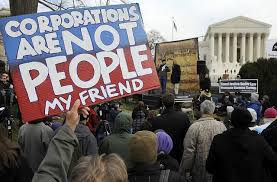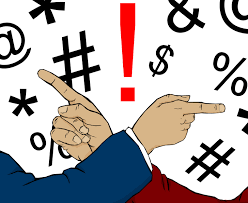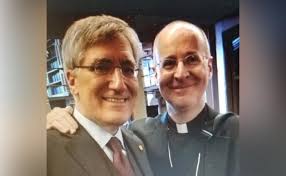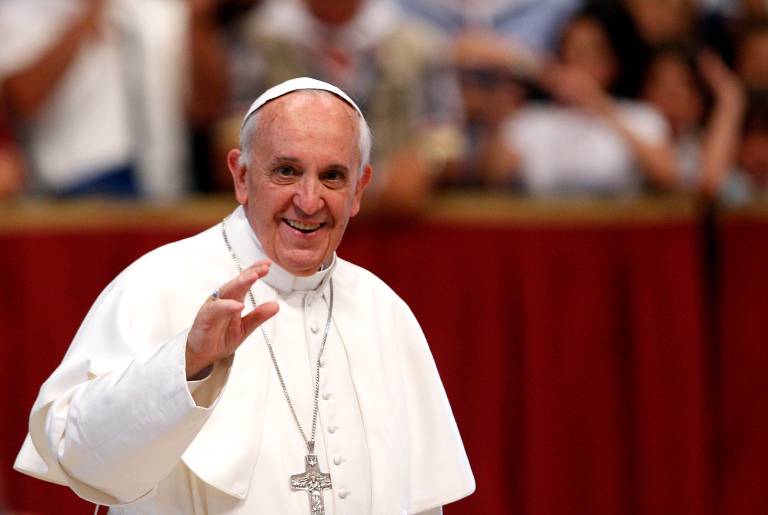In the wake of Hobby Lobby, the attacks on religious belief in the public square—along with the confusions which often fuel such attacks—have been…shall we say…even more apparent. As our Jason King pointed out Monday, the Chronicle of Higher Education recently published a piece by Peter Conn which let loose with both barrels. He leaves nothing to the imagination in claiming that Christian colleges and universities “systematically undermine the most fundamental purposes of higher education.” Can’t misinterpret that kind of direct statement.
On the same day, a piece was published in the Huffington Post by Ronald Lindsay who led off by admitting that what he was about to ask might appear to be based on bigotry. The maybe bigoted question? “Is it appropriate to have six Catholic justices on the Supreme Court?” For Lindsay, a widely published public bioethicist, the reasoning of the majority in Hobby Lobby “effectively undermines confidence in Catholic judges.”
The confusion present in these and many other hit jobs on public religious belief, especially post Hobby Lobby, appears to rest primarily in a broader confusion about the nature of religious belief itself. A paradigmatic example of this confusion can be found in Justice Ginsburg’s dissent when, contrasting them with for-profit corporations, she claims, “Religious organizations exist to foster the interests of persons subscribing to the same religious faith.” A moment’s reflection on institutions like a Catholic-run women’s shelter or a Jewish-run hospital demonstrates that this claim is not only mistaken, but just plain odd.
But it may seem less odd when we think about how others on the court reacted. Another moral theologian wrote me after the decision and made the following point:
“Two of the Jewish justices apparently agreed with the Catholic justices about the extension of personal religious freedoms into corporate structures, with specific reference to Jewish delis—that is, if a deli incorporates, does it lose the religious freedom to follow kosher in the event of regulation. So the problem of the Religious Other who fails to understand the secularized-Protestant consensus on the “private” nature of the “spiritual” kingdom is even worse than it appeared.”
It would be quite natural for those influenced by Judaism or Catholicism to reject the idea that religious people cannot come together and form a public businesses with a corporate religious identity. It would be difficult for these traditions to imagine a religious identity could be anything but corporate, just as it would be difficult for both traditions to check their faith at the door of their offices and in effect admit that this public activity operates by a different set of rules. It would be an admission that they serve two masters.
Some of most scathing criticisms of the view that Hobby Lobby could have a corporate religious identity have come from the very same quarters that (rightly, in my view) push businesses to pay their workers a living wage. Would, say, Catholic owners of a closely held corporation have a duty to follow Catholic social teaching and pay their workers such a wage? If it makes sense to talk about a business having religious duties, then it makes sense to talk about a business having religious freedom to exercise those duties. (Incidentally, and while on this point, not enough people have pointed out that the Christian faith of Hobby Lobby’s ownership was reflected in the justice-centered way they compensated their employees—paying them twice the minimum wage.)
This view may resonate with many Catholics and Jews, but as the colleague who wrote me suggests, this isn’t exactly the understanding of religion espoused by a significant number of individual- and privacy-centered US Protestants. And it is this view of religion that has been running the show for multiple generations when it comes to our culture’s dominant understanding of religious freedom. On this view, the US public discourse is “secular” and operates by a set of rules and principles which are different from one’s private “religious” life. The latter receives the protection of religious freedom, while the former does not. (Or at least not in the same way.) Indeed, the Center for American Progress went so far as to say that the new SCOTUS ruling that public businesses now have religious freedom “turns the notion of secular society on its head.”
That is a little dramatic, but it is not wrong. As Cathy Kaveny points out, Hobby Lobby was an activist, progressive decision on the part of SCOTUS. It is a decision which, in my view, expands the notion of religion in a way which defends vulnerable religious minorities, and in particular religious minorities whose understanding of their faith requires them to reject the individualism and privatization of the more dominant understanding in our culture.
But there is another way in which (US-style) religious freedom creates problems for religious minorities in this country, and it also connected the nature of religion and of religious claims. The Chronicle and HuffPo pieces cited above both rest on an epistemological confusion. Conn and Lindsay give no indication they are aware that all normative claims are contextual. That anyone making normative claims starts with faith-based first principles. That most often these principles are under-girded by a narrative or story which simply grabs or claims one by some kind of intuition or other authority.
The uncritical assumption shared by Conn and Lindsay is that while “religion” may have this faith-based foundation, the “secular” world is not so encumbered. Many moral theologians find this view naïve in the extreme, and the response so obvious that it hardly needs to be said. But especially given the post-Hobby Lobby reaction, it apparently needs to be said: the first principles of every normative tradition—from hedonistic utilitarianism to ecofeminism—are based on some kind of dogmatic appeal to authority. And that authority is often wielded and enforced by those with power, especially in the academy. With this insight in mind, Alan Jacobs did this take-down of Conn’s position in The New Atlantis, arguing that
“academic freedom is a concept relative to the beliefs of the academics involved. I have a sneaking suspicion that [Conn] is even naïve enough to believe that the University of Pennsylvania, where he teaches, is, unlike Wheaton, a value-neutral institution. But as Stanley Fish pointed out years ago, “What, after all, is the difference between a sectarian school which disallows challenges to the divinity of Christ and a so-called nonideological school which disallows discussion of the same question? In both contexts something goes without saying and something else cannot be said (Christ is not God or he is). There is of course a difference, not however between a closed environment and an open one but between environments that are differently closed.”
Ross Douthat has made a similar point. He argues that we have
“a serious moral defect at the heart of elite culture in America. The defect, crucially, is not this culture’s bias against social conservatives, or its discomfort with stinging attacks on non-Western religions. Rather, it’s the refusal to admit—to others, and to itself—that these biases fundamentally trump the commitment to “free expression” or “diversity” affirmed in mission statements and news releases. This refusal, this self-deception, means that we have far too many powerful communities (corporate, academic, journalistic) that are simultaneously dogmatic and dishonest about it—that promise diversity but only as the left defines it, that fill their ranks with ideologues and then claim to stand athwart bias and misinformation, that speak the language of pluralism while presiding over communities that resemble the beau ideal of Sandra Y. L. Korn.”
But I go with Jacobs over Douthat on the source of the problem: I don’t think it is dishonesty. I think it is a genuine mistake based on confusion. And it is a confusion which, ironically, may have its source in a similar confusion present in the self-understanding of American religious believers. Certain kinds of publicly influential American Christians (mostly Protestant, but the critique applies to many Catholics today as well) have simply accepted the secular/religious binary, and have agreed to play by the its rules in our public discourse. Implicit in these rules is a sense that a “secular” discourse, evacuated of all explicitly faith-based content, is somehow more objective, more rational, more convincing. It is therefore more appropriate for the public sphere. Explicitly faith-based approaches are not appropriate for serious academic institutions and for evaluation of federal laws by serious Supreme Court justices because such approaches are beholden to faith based first principles.
But as Jacobs, Douthat, and many, many others (another important example is that of Jonathan Haidt) have shown, “secular” normative are similarly beholden to dogmatic starting points. One unintended consequence of accepting US-style religious freedom has been that these traditions get a free pass, and continue to have a privileged place in our public discourse based on their supposed objectivity and rationality. Why does this myth persist? Perhaps their not being explicit about their faith-based starting points, and therefore not identifiable as “religious”, means that by default they must be on “the other side” of our simplistic religious/secular binary. Meanwhile, those who are explicit about their faith-based starting points–especially when those starting points challenge the dominant view of the nature of religious belief–are marginalized from the public discourse and subject to what in other contexts would be called bigotry.
Happily, the Hobby Lobby decision not only created new breathing space for those with the minority view, it provides a much-needed opportunity for our culture to adopt a more authentic understanding about the nature of religious belief and its role in public life.






Seems to me that, beyond the disagreements about the nature of religious faith and public life that you reference here, the post-Hobby Lobby disagreements are also about who or what this decision actually serves to protect: the rights of “vulnerable religious minorities”? or the rights of for-profit, publicly traded corporations? The latter, I think, is a different animal than the kind of corporate religious body of a church or religiously based non-profit suggested in your post (even in a “closely held” corporation, the bottom line is, finally, the bottom line)–and one which it would be difficult to argue is particularly vulnerable in America today. It’s not necessarily or only the case that those who are wary of this decision believe that faith must be something private and individual in contrast with the supposedly neutral rationality of a secular public square (though there is that, to be sure). There is also an aversion to the expansion of for-profit corporate power vis-a-vis employees and citizens–the lingering bad taste of Citizens United and McCutcheon, perhaps?–which is, I think, a mirror-image of the aversions of those who fear the encroachment of government power on religious believers. Which is a greater threat in the U.S. today? And which does this decision do more to protect and promote?
Jessica, first, there has been a lot of misinformation put out there by media who have not read the opinion. It had nothing to do with “publicly traded” corporations–those would be excluded by the “closely held” provision. Most of the corporations that would be impacted by this ruling are relatively small ones. We aren’t talking about NBC Universal and Wal-Mart.
Second, we don’t hand out religious protection for religious minorities based on other kinds of vulnerability, do we? Would we deny religious protection to Hobby Lobby because its owners are rich and affirm it for a Jewish deli which is drowning in debt and suffers from racial discrimination? I hope that isn’t the basis of our protecting the rights of religious minorities. The vulnerability to which I was referring was with regard to their views they hold on specific issues, and of their view of religion more generally. All one need do is look at the bigoted vitriol hurled at those with such views to see this quite clearly.
Further, I fail to see how this is an expansion of power for corporations–at least in a negative sense. Those of us who hate the neoliberal profit taking imperative of almost all corporations should welcome the space created for closely held corporations with a religious identity to operate by a different set of values, no?
Secularity is not dogmatic; it is ungrounded (or decentered). There is a difference and the conflation of the two terms by theologians, in an attempt to rationalize the believer’s claimed access to some transcendent Ground as the basis of their belief, is going to appear disingenuous, at best, to the non-theologian. In order to express what it is at stake in the intellectual conversation, the conflation is unhelpful and unfruitful.
That being true, the question of how much space the secular should provide to the dogmatic, and whether the dogmatic can tolerate the secular, would still remain open conversations. But the two are not equivalent.
Nor is it apparent to me how such a conflation of the dogmatic-religious with the ungrounded protects the vulnerable.
L of A, can I ask whether you’ve read MacIntyre and/or Hauwerwas on the (so called) secular? I’m of view that “the secular” as this decentered, ungrounded intellectual arena is a myth. There are absolutely centered, grounded centers of value in play in the secular normative traditions…dogmatically posited and aggressively enforced.
You may disagree, but it is pretty weak sauce to refuse to make an argument and instead accuse your opponents of being disingenuous when they don’t accept your (in my view, mistaken) terms of the debate.
Yes of course. And obviously I’m not too sympathetic, to H. But in MacIntyrean terms, what the secular insists upon is, precisely, the irreducible plurality of the traditions and the arbitrariness of their founding. Or, to put it slightly differently, one should not confuse AMac’s critique of individualism or modern liberalism with a critique of the secular (the real limits to AMac reside in his leftover realism from his Marxian days…but for all practical purposes, AMac himself inhabits and is an excellent example of a secularist when he provides his theory of traditions…without the secular, one would never recognize something like traditions in the first place…one would simply see heresy, apostasy, and paganism, etc (i.e., simple error)…not alternative positive rationalities arising from the ungrounded nature of traditions themselves). The secular acts as a kind of condition of possibility for the experience of MacIntyrean traditions. The attempt to justify a dogmatic founding (i.e., no, our founding isn’t arbitrary…we have access to a revelation from the Source…reality really does have a center; we promise (e.g., Christ the Center) through an appeal to the admitted arbitrariness of the secular is just a category mistake, breaking with the immanence and finitude of the secular to appeal to a transcendence which, if true, would traditions unnecessary to begin with.
Now of course, every arbitrary positing around which a tradition organizes itself posits a “center” by which it is organized: i.e., it establishes institutions and organizes its accumulated power to maintain them and they last for as long as their are generative. Which is why something like the Hobby Lobby case becomes a question of much space can the secular institution allow for a group who demands to be treated as an exception because their ‘center’ is not arbitrary, but dogmatic.
P.S. I made a similar argument at too much length (and with quite a few typos) on King’s post, where postmodernity was similarly invoked as a kind of get out of jail free card for theology. I simply don’t see how it can have that function; in fact I think the opposite is true and it raises the stakes on the Enlightenment critiques of religion (which remain all too ‘centered’). Theology has to take those challenges much more seriously than that kind of response does (imo).
Charlie,
I agree with you that we need space in the public sphere for religious claims, including the claims of businesses with religious duties. I agree that we all make normative claims that come from somewhere.
But I think the issue in this case is what to do when religious liberty interests (or duties) conflict with compelling interests of the government acting on behalf of individuals. Some would argue that in this case the government is trying to protect vulnerable people (i.e., women who can’t afford contraception) who have very little power in a big corporation. If a company pays higher wages, there’s no conflict of interest, but in all the major religious liberty cases including this one, there are very real conflicts.
I support carving out a wide space for religious liberty. But I worry that by interpreting RFRA so broadly, the Court leaves little room for questioning religious liberty claims. In cases of conflict, it seems important to protect faith-based actions, but to protect facilitating or cooperating with the actions of others is a whole other level of accommodation. I have trouble envisioning how this will work in s country with so many competing faith claims.
Isn’t recognition of the limits of religious liberty interests imperative, even for those who are not at all secularist?
Julie, this decision was only made b/c the Court recognized there was a far less intrusive way for the government to meet the goal of providing 4 of the 16 methods of contraception that HL failed to provide.
Can you say more about why extending religious liberty to closly held corporations causes new kinds of problems? The standard is still that such claims are limited by compelling state interests. I support these limitations.
What I don’t support is arbitrarily claiming that certain groups of faith-based individuals are forced to check their religious freedom at the office door. For-profit corporations are some of the most important places where we need to create room for religious identity. Indeed, doesn’t this follow directly from claims that Catholic-run businesses have a special duty to follow CST and pay their workers a living wage?
Julie,
My perspective on this case is shaped by a desire to protect people whose religious commitments are counter-cultural (similar to Charlie). But it is also shaped by my experience working for 10 years in a Catholic school which, in keeping with our archdiocesan-sponsored health insurance plan, provides less health insurance coverage for contraception than Hobby Lobby is willing to provide. As is the norm for Catholic schools, the overwhelming majority of employees at my school are female. I suspect that few of them fully accept the Catholic Church’s teachings on contraception. Most of them could probably find jobs elsewhere—jobs that would likely provide contraception coverage and pay better too. So, why do so many women work at my school, and at other Catholic schools? Why do so many of them work at the school for decades, despite the lack of contraception coverage? My sense is that other priorities are far more important. A work environment which provides a supportive community, solid administration, and vocational fulfillment seems far more important to my co-workers than the lack of contraception coverage in our health insurance policy. People complain about various things in the faculty lounge, but this isn’t one of them. Co-workers sometimes take jobs elsewhere to earn higher salaries (the struggle to pay a truly living wage while keeping Catholic schools affordable is vexing)–but I have never heard a departing co-worker say that contraception coverage was an important consideration in a decision to change jobs. When I hear the Hobby Lobby commentary which condemns an employer ‘forcing’ its religious beliefs upon dissenting female employees, I wonder how many Hobby Lobby employees feel as oppressed as they are portrayed to be. How many are like my co-workers who have remained loyal employees for decades despite modest salaries and lack of employee-sponsored contraception coverage? While a religiously-motivated decision not to offer employee-sponsored contraception coverage might seem like a horrible imposition to some people, they usually have the choice to work elsewhere. Some people might find it intolerably inconvenient to work for an institution whose religiously-motivated owners required meticulous recycling of all office waste. Others might seek that same religiously-motivated environment as an ideal workplace. I would avoid choosing a job that required me to work from midnight to 6 a.m., or to live in a foreign country away from my family. I would not want a job that required me to work in high places, to fight fires, drive a large truck, or pose for photographs in bikinis. There are many sorts of jobs that have aspects I couldn’t easily tolerate. Thus, I haven’t sought those jobs. I think the post-Hobby Lobby-conversation over conflicting religious positions needs to be balanced by the realization that virtually every job has aspects that will be intolerable to some people. There are limits, of course—we need to prevent inhumane, oppressive work environments. But, in light of my work experience in Catholic schools, the characterization of Conestoga/Hobby Lobby’s owners’ goals as ‘oppressive of women’ seems exaggerated.
Thanks for this.
I wonder, though, whether you’ve overstressed the degree to which we get our first principles from the cultural narratives in which we’re embedded. While I haven’t read his Marquette lecture on first principles, I suppose that even MacIntyre would grant (following Aristotle) that we come to some of our principles more by means of culture or narrative, others more through interaction with nature or reality. Of course the line between the two is fuzzy as all get out, and our perception of “nature” is usually framed in narrative, but it remains true that there are certain agreed-upon starting points that seem unavoidable no matter the particulars of one’s narrative.
A small caveat, to be sure. I really enjoyed the post overall!
cheers,
–DL
AMac actually denies that you can make a direct Aristo-Thomist appeal to nature/reality; modernity has cut off that path. He instead proposes to arrive there by means of a passage through genealogy (which MacIntyre tries to turn into a dialectical form of critical realism by the time it is over). Now that does imply certain fundamental ontological claims, but it does not, it seems to me, let him get back to the metaphysical realism that he actually desires. One way or the other, he is clear that, now, one has to begin with the various competing narratives and not ‘first principles’ and thereby try to show that Aristo-Thomism out-narrates everyone else in its telling of history.